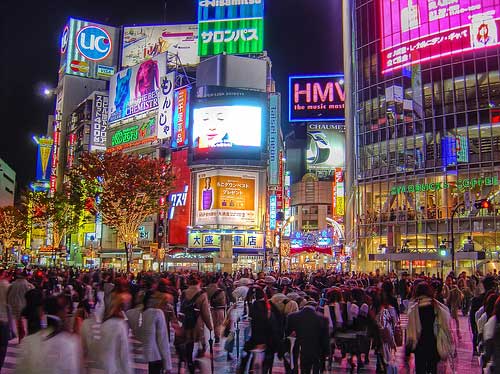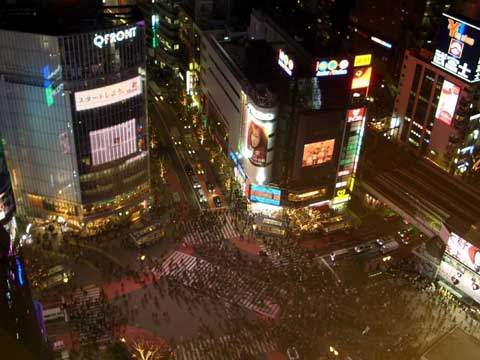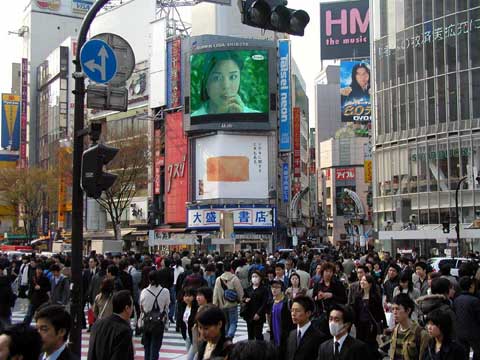Scott Campbell
The Shibuya Incident
After we had concluded our business meeting for the day my colleague suggested that we take what time we had before our dinner plans to see some of the city. I was fascinated by the size and scope of Tokyo. A city of over thirty million people, Tokyo is sprawled out in such a fashion that while driving through it to get to a company sales office I wondered if the urban portion ever ended. We traveled to the Shibuya section of the city. It is the busiest pedestrian crossing in the city. It has large video billboards which have earned it the nickname “Times Square of Tokyo”. The square at Shibuya has large billboards and electronic displays. So many that it can drive you to distraction. Most of the signs are in Japanese but some are in English. It is really a visual and sensory bombardment with lights flashing and blinking.
The most interesting are the video displays that look like giant televisions showing commercials for the latest products that the average citizen of Tokyo just can't live without. As we were preparing to cross the street during a very busy rush hour time I looked around me and noticed that there were literally hundreds of people crowded around on the street. We just stopped on the sidewalk as people rushed by us in what seemed like every direction. I sometimes forget how loud a public setting can be. A person at a sporting event thinks nothing of the loud noise level at that stadium because they associate the setting with raucous noise. When you put the equivalent number of people in a small crowded square and add the noise of traffic and electronics all around you the noise can be deafening. It was then I realized that we could possibly be the only Caucasian people for fifty kilometers at that point in time. I made a comment to my colleague about that very feeling and he turned to me and said, “Now you know what it feels like to be black in America.” At the time, his comment made me feel as if I was out of place. I felt like I didn’t belong there in a deeper sense, larger than the fact that Japan is not my home and I was just a visitor. Here in Tokyo, I was different and I was standing out instead of blending in. Instead of being in the majority, I was a minority.
In that very same square at the very same time an average citizen of Tokyo was trying to get home from work near the Shibuya section of Tokyo. His name is Hiro. Hiro has a low-level office job and needs to take the public transportation that is near his building. Hiro has to walk through the crosswalks at Shibuya everyday along with thousands of other Tokyo residents on their way to work. Hiro spots two tourists standing on the sidewalk just looking around. They were white and probably American from the way they were dressed. They certainly were not in a rush like the rest of Hiro’s city mates because they were just standing there. Just two American guys in the sea of Japanese people hustling along to wherever they were going. By the looks on their faces, Hiro wondered if they had ever seen this many Asian people in such a small space in their life. Perhaps they had never seen this many people of any race in such a setting. For the most part people just walked by them as if they were not even there. Tokyo is a huge city. It gets its fair share of tourists from all over the world in all seasons. Shibuya is a very popular location for tourists and it's not unusual at all for Hiro to see little groups of them here and there. It looked to Hiro as if these two are on a business trip. Usually when Hiro sees two grown white men traveling together without a wife or children they are in Tokyo for business, especially when they are not wearing casual clothes.
In Hiro’s mind, one of the amazing things that globalization has brought to the world is that years ago if the same two Americans were standing in the middle of Tokyo it would be a major sight. Now with the way people of most countries travel and conduct business abroad instead of sticking out in the crowd these two are a normal everyday sight. Hiro noticed that one of the two had a look that gave him a sense that he was feeling very alone and different. Hiro wondered if he felt alone because he was far from home and didn't looking like everyone else around him. Perhaps the real reason he felt alone was because he was just blending in like the rest of crowd here in Tokyo.
After returning to America that experience stuck with me and I gave it more thought. As a white person in America I often thought about the condition of other races and of racism in general as a problem with our country. I realized from my experience that I am different from people of color in a way that I can’t control and that my perspective will always come from a certain point of view. As much as I can empathize with people and try to understand things from their perspective I will never really know what it is like to be Black or Latino. I always try to remember that I can’t simply try to fit others’ experiences in to my context. This incident was very meaningful to me for a number of reasons. This incident occurred on my first trip outside of the United States, which was a tremendous growing experience for me. The reason I took on the new position was that I was still young and had very few personal commitments. This job provided me an opportunity to travel and see the world without having to pay out of my own pocket. I grew up in a small town in New England that wasn't very culturally diverse. The ethnic groups that were represented would be considered "white" by today's standards. There were Polish, Finnish, Italian and Irish families that had been in my area for years but not much representation of Black, Asian or Latino culture. What was also interesting to me was that most of my friends and family had no real intellectual curiosity to visit or learn about other people or cultures. They were fine with their little piece of Massachusetts. I really felt that I would be able to grow as a person by having exposure to other cultures by actually being there, something that a book or a movie just won't provide.
From the timeline perspective, this incident occurred in the late 1990's. The year was 1999 and the world was experiencing the rapid advancement of the Internet and globalization. The idea that each country was its own entity and could be insulated from other nations around the world in the areas of culture, economics and politics was quickly becoming outdated and untrue. The world had reached six billion people in 1999 and its still growing. The world was becoming a much smaller place and through my travels I realized that I was definitely not in the "global" majority. By traveling the world and getting firsthand experience to other cultures I was experiencing a personal "globalization". I realized that the small world of New England that I came from was only a fraction of the world.
The incident provided me with a small taste of what it is like to not be part of the majority group. A person in the majority group of a society can believe that they know how a person in the minority group feels when they come up against racism or sexism but in reality they will never know until their society is transformed to a point where they are in the minority group and suffering the same injustices. I don't want to suggest that I can speak for minority groups now because my experience was not one where I was discriminated against or persecuted because of my skin color or sexual orientation. What the incident did provide me was a window in which I could look at the world around me from a different perspective and see that life experiences are not the same to all people, the experience of any incident depends on your point of view. My point of view for the first time became that of the minority, not the majority.
Return to Personal Memory Ethnographies
homepage


